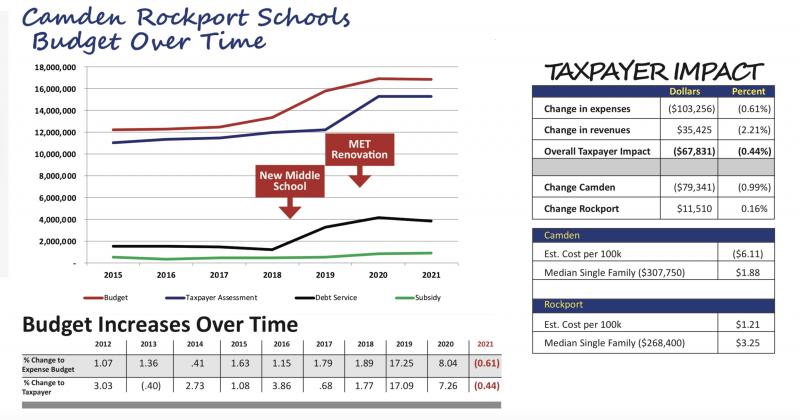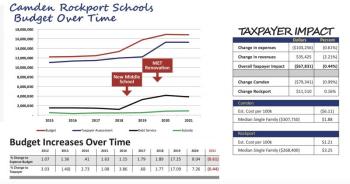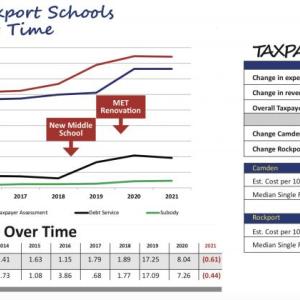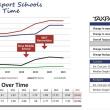Rockport Select Board disputes school district claims regarding over-billing investigation
ROCKPORT — The Rockport Select Board convenes Sept. 28 for a regularly scheduled meeting. In the board packet, which consists of back-up material to be discussed at the meeting, is a statement dated Sept. 22 and issued by the Rockport Select Board concerning the lawsuit it filed against Camden and School Administration District 28, of which Rockport is a member.
The statement, which follows below, lays out the Rockport Select Board’s arguments concerning the course of events from 2009, when the errors were reportedly made that resulted in over-charging Rockport taxpayers for educating K-8 students in Camden and Rockport, and undercharging Camden taxpayers.
The board said in the statement: “It was a failure to carry out the school district’s most basic operational functions for which they must be held accountable to Rockport taxpayers who overpaid significant funds, and to Camden taxpayers who will be responsible for repaying those funds going forward.”
To date, there has been no joint meeting of the two towns’ select boards with the SAD 28 School Board, which also represents Camden and Rockport select boards. The investigation of the over-billing continues as Suzan Beaudoin reviews the school district’s calculations since 2009. Beaudoin was initially hired by SAD 28 to look at the apportionment levies of 2020-2021, which she accomplished in August. She reinforced the district’s decision to reduce Rockport’s share of the current year’s budget and increase Camden’s share.
In his Sept. 24 Rockport Town Manager’s report to the Select Board, William Post wrote: “All three of Rockport’s representatives to the School Board have stated that they are available and willing to attend either of the October Select Board meetings to discuss the concerns of the Select Board and open the lines of communication.”
The discussions of the Rockport Select Board take place behind closed doors in executive session, because, as articulated by Board Chair Debra Hall, on Sept. 7: “There is a reason that Select Boards discuss litigation matters in executive session, to maintain the attorney-client privilege and to openly discuss matters with their counsel. To the extent that the Rockport Select Board can keep the public informed about the general status of matters it will but strategies, tactics, settlement offers and responses cannot be disclosed without prejudicing the town’s position. It is in the best interests of Rockport residents to maintain this confidentiality though I certainly understand their desire to be informed as much as possible.”
The Sept. 22 statement was issued following an afternoon meeting that day with the town’s counsel, Eben Albert, of the Portland-based firm Bernstein Schur. That meeting lasted until 5:45, when the board exited executive session, according to meeting minutes, and unanimously voted to issue its statement.
Meanwhile, and while Rockport issued a request to Knox County Superior Court to put a stay on the litigation, the Town of Camden, through its attorney, William Kelly, of Belfast, responded on Sept. 14.
He wrote in the town’s legal response that he had been provided a copy of Rockport’s filing concerning a motion to stay the proceedings: “While I disagree with the content of the motion, and disagree to which aspect of the Plaintiff’s complaint is appropriately primary and which is appendant, I request that the Court take no action on this motion until the Town of Camden has been made a party and has had the opportunity to appear and file responsive pleadings.
He further asked the court to conduct a phone conference among the parties before composing a court schedule.
Rockport Select Board Statement Regarding the Erroneous School Assessment Allocation
On August 28, 2020, the Town of Rockport filed a lawsuit against MSAD #28 and the Town of Camden seeking damages, interest and attorneys’ fees for multiple-year overpayments made by Rockport to the school district. These overpayments reflect amounts that should have been paid by Camden taxpayers and were charged to Rockport taxpayers in error. Although Rockport hopes to work with Camden and the school district to resolve this dispute amicably, Rockport acted prudently to take the action it did, when it did, in order to fully protect the town’s rights and avoid any suggestion its claims were not brought in a timely fashion, which might have affected Rockport’s ability to recover the full amount owed to it from the school district’s erroneous assessment.
The formula applied to determine each town’s share of the school district assessment is established by State law and, while complex, it should be well understood by the school district officials whose job it is to apply that formula. It was the school district’s responsibility to know that property valuation is a key component in that formula, as acknowledged in a July 29, 2020 letter from the school district’s attorney, William Stockmeyer, to superintendent Maria Libby. That letter clearly set forth what we all now know for certain – that the overall property valuations of the Towns of Rockport and Camden must be taken into account in determining the annual amounts owed by Rockport and Camden, not just the number of pupils.
The superintendent has recently stated that Rockport taxpayers have been overpaying their school obligation dating back to at least 2009. Although the school district has suggested that we should only fix the problem going forward, Rockport disagrees. It is the responsibility of the Rockport Select Board to recover the full amount of overpayment that Rockport taxpayers have made plus interest. (The corrected error for the coming year alone will result in Rockport paying $490,580 less than the school district’s business manager advised Rockport in June that it would owe.) This error on the part of the school district, by their acknowledgement, made for more than a decade, has caused Rockport’s mil rate to be higher than it should have been, has inhibited various Rockport Select Boards from making infrastructure maintenance and upgrades, and has overall added stress on a budget for which more than 65% goes to the school district even without overpayment.
Although the superintendent has credited the school district’s new business manager and herself with finding the error this summer, the facts reveal that the superintendent was aware of concerns several years ago but disregarded them. In fact, the school district misrepresented to Rockport the requirements of State law and the proper factors to be applied to the assessment allocation to Rockport and Camden as demonstrated below:
• In January 2017 correspondence, the Rockport /Camden town assessor questioned the school district’s business manager as to why spreadsheets were showing the cost of bonds for the new middle school as a 50/50 split between Rockport and Camden, placing a higher proportional cost on Rockport taxpayers despite its lower population, and asking whether anticipated changes in the towns’ valuations would impact their respective contributions. The school district’s business manager advised the assessor that for MSAD#28 “allocations between towns are based on sending students.”
- In January 2019, the towns’ assessor inquired of the now chair of the school board and school superintendent, when the two towns’ property valuation changes were going to be reflected in the school assessment allocation of the two towns. The assessor pointed out that Rockport’s valuation decreased in 2015 and Camden’s valuation increased in 2017. The school district did not respond.
- Finally, in June 2019, after Rockport staff followed up, the school superintendent incorrectly stated in an email “[t]he answer is actually very simple, but will not offer much satisfaction. Rockport’s valuation is irrelevant in our school funding formula. We are a minimum receiver (Camden and Rockport) and the share of the budget for each town is based solely on student numbers.”In the view of the Rockport Select Board, this repeated error should never have been made. It is the legal responsibility of the school district to properly assess the taxpayers who provide the funding for their operations and pay the significant debt service on new school construction. And when concerns were raised by the Rockport / Camden assessor, it was incumbent upon the school board and the superintendent to have reviewed and verified their understanding of State law and its application. This was not a math error – it was a failure by the school district to understand the fundamentals of how the school district assessment formula works under State law. It was a failure to carry out the school district’s most basic operational functions for which they must be held accountable to Rockport taxpayers who overpaid significant funds, and to Camden taxpayers who will be responsible for repaying those funds going forward.
- Rockport relied on these and other statements of the school district as the agency charged with administering the assessment formula.
Event Date
Address
United States





























